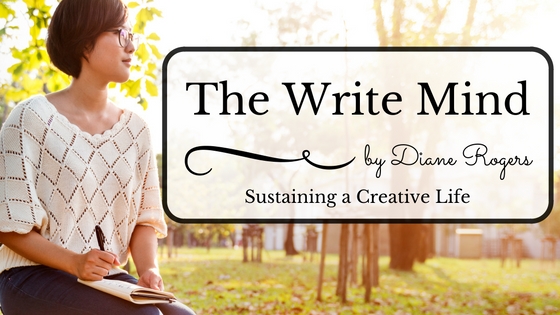by Diane Rogers
All you have to do is write one true sentence. Write the truest sentence you know. ~ Ernest Hemmingway, A Moveable Feast
It has been said that a writer’s job is to successfully communicate a truth. But in the brave new world of “fake news,” “alternative facts,” and “post-truth” politics, does truthfulness matter anymore?
More than ever.
Truth Matters
Truth is the emissary of the human spirit. Its purpose is to grab the reader by the collar, crawl under her or his skin, lodge itself deep inside the psyche and linger indefinitely. In a sea of words, truth is the ineffable detail that renders readers breathless, moved, expanded, and elevated.
Truth is Inner Ecology
When I think of “green,” the science of ecology springs to mind. Most people understand ecology as the biological study of living organisms and their environment. In recent years, ecology has evolved into an inter- disciplinary approach for exploring the interconnected relationships between individual components and the larger system in which they function.
The study of ecology extends to psychology as well.
Personal ecology means recognizing how your unique thoughts, beliefs, feelings, and experiences impact your physical and mental condition and your life as a whole.
As writers, we spend much of our time in our heads. A focus on personal ecology can help us achieve a state of inner connectedness and well-being. If you are out of touch with yourself or unplugged from your relationships, it is impossible to access or write from a place of truth.
Truth is the Basis of Empathy and Connection
Vulnerability expert and author Dr. Brene’ Brown says we can’t others give what we don’t have within ourselves. The same is true for writers. To evoke emotion in our readers, we have to first conjure it within ourselves.
At a time in my life when I struggled to understand love—the brutal, burning kind, a depth of emotion I had no words for—Michael Ondaatje’s honesty in The English Patient saved me from isolation. Passionate sentences like
We die containing a richness of lovers and tribes, tastes we have swallowed, bodies we have plunged into and swum up as if rivers of wisdom, characters we have climbed into as if trees, fears we have hidden in as if caves
helped me feel less alone, less desolate. While reading the book, I waded through suffering and rapture one step at a time alongside Ondaatje’s characters. The author gave me a language for what I had been unable to express. His words made it easier to withstand an unbearable love, and dignified the experience of walking around with my heart on fire in full knowledge the intensity was unsustainable. In the companionship of Ondaatje’s book, my personal agony became somehow more manageable. I sensed the author had stood in my shoes and understood my affliction. I dare say Ondaatje’s ability to use such a visceral description of landscape to portray the uncharted territory of passion meant he, too, had been lost inside the labyrinth of emotion without a map.
Author Frank McCourt is another excellent example of a writer who communicates throbbing truths without becoming trite or reactionary. In Angela’s Ashes, McCourt’s profound sensitivity and deep insight illuminated a heartbreaking childhood the privileged among us would otherwise prefer not to see.
Improving Inner Connection
Emotion is the bi-product of experience. Like method actors, good writers are called to draw on personal experiences, digging deep to examine and express authentic sentiment in their work. The story may be fictional, but the emotion is real.
The key to authentic connection is personal awareness, and the best way to improve individual acuity is by “tuning in.” Taking time out to observe and reflect on your physical experiences will increase your awareness of your body’s sensory messages.
Some simple mindfulness practices include getting outdoors and coming to a sensory awareness of the earth beneath your feet, the smell of the shrubs and trees, the feel of air on your skin. What is your body’s relationship with the natural world? How does this relationship differ between environments?
Practice:
Another exercise involves checking in with yourself on a regular basis, asking:
- What is my body telling me right about its needs?
- What am I sensing around me right now?
- What am I feeling within at this moment?
- What is in balance? What is at odds?
- What am I choosing to believe at this moment?
- What is the relationship between my beliefs and my actions?
For example, as I write this post my body tells me it is both hungry and thirsty. It is also demanding exercise. I’m aware that I feel annoyed by my thoughts which are slow to formulate on this rainy Saturday, and I would rather be outdoors. The sound of the wind and rain pelting the trees adds to my irritation because the weather conflicts with my desire for fresh air and exercise. I believe strongly in “work before play,” so I can push my body and mind past the temporary discomfort. There is congruence between my beliefs and actions. I can now use my awareness to highlight a character’s deep internal conflict through a creating sense of being trapped in a stale interior landscape and locked into duty at a time when the wider world is calling.
Insight is among a writer’s best friends. As you increase awareness of yourself, you can use your fresh awareness to produce holistic characters whose thoughts, feelings, and actions are more consistent with their core beliefs and motivations.
Truth Leaves a Legacy
Great writers throughout history have understood the power of truth to influence readers. They have observed themselves and others before granting their characters the courage to be as authentic, offensive, intrusive, or inconvenient as the truth they are trying to convey.
Irrespective of genre, a story crafted from authenticity leaves its mark. No amount of literary sleight of hand can substitute for a writer who proffers in honesty. Comedic writers are master truth tellers, keeping audiences in side-spitting stiches while holding a satirical mirror to hard-hitting truths.
Plunging into the murky world of personal ecology and emerging with literary pearls again and again is far from easy. At its best, effective writing connects directly with hearts and minds revealing universal human experiences.
Like an unexpected kindness, a truth that resonates with our innermost being is never forgotten.
Tell us what “one true sentence” holds special significance for you. Which writers have had the greatest influence on you? How do you access and write from your truth?
***

Dr. Diane Rogers, Author
After retiring from a corporate career in business transformation and change management, Dr. Diane Rogers brings her expertise in social psychology to classrooms and families.
Her first picture book, Stand Tall, made its debut at the 2008 Seeds of Compassion Conference in Seattle, Washington featuring His Holiness the 14th Dalai Lama. A week after the book’s release, the State of Washington selected Stand Tall as an official teaching resource for compassionate education. Diane’s other published works include Emerge, A Story of Confidence, and When We All Stand Tall. To find out more, visit www.drdianerogers.com.
A self-professed global nomad, when they aren’t traveling on or jumping out of planes, Diane and her husband Kevin triangulate between Sydney, Australia, Newport Beach, and their sailboat in the Mediterranean.
*O.C. Writers is a participant in the Amazon Services LLC Associates Program, an affiliate advertising program designed to provide a means for us to earn fees by linking to Amazon.com and affiliated sites. By clicking on the book links anywhere on this site, we earn a small commission from your purchase.





What is the relationship between my beliefs and my actions? This question was the basis of my 2017 resolutions. Thanks for confirming my direction this year.
Hi Michelle, I’ve only just become aware of your comment today. Beliefs underpin actions. In other words, beliefs are the underlying motivation for action. However, many things we do are the result of unconscious beliefs. A goal that gets consistently derailed can often hold clues to a deeper, unconscious negative belief. Best, Diane